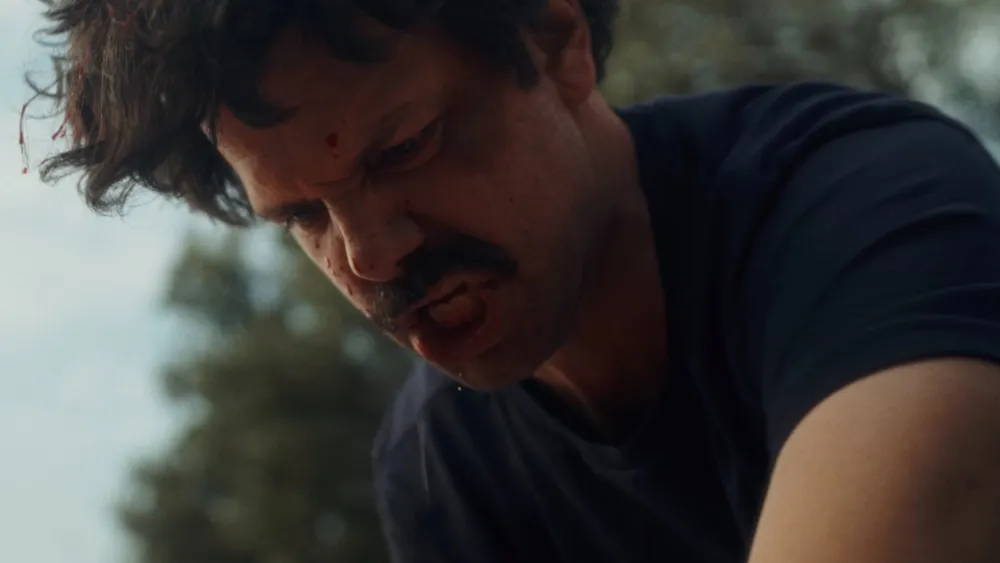In times as paranoia-tinged as the ones we live in, art and media are bound to reflect our conspiracy-prone reality. Writer-director Eric Owen’s Thirst (2023) is another entry in the canon of overly suspicious conspiracy thrillers, and it feels especially at home in the current era. Aliens, pandemics, and shadowy cabals are all over the internet, and trust in traditional government feels like it may be at an all-time low. Behind all these theories is a prevailing sense of fear and distrust, which are prime emotions for cinema to tap into. That is what Owens attempts with this project, which leverages the prevalent tensions of our time to deliver drama and scares. It is only partially successful, held back by a meandering script and heavy-handed direction.
The plot follows Jose (Brian Villalobos) and his wife, Lucy (Lori Kovacevich), a middle-aged couple trying to have a baby. Jose is trying his best to rise up at his workplace (some kind of a firm) but is plagued by sleepless nights and visions of doom (more on those later). Meanwhile, Jose’s half-sister Vickey (Federica Estaba Rangel) is in a troubled relationship with musician and casual conspiracy theorist Lisa (Stephanie Slayton). The family is close with their friends Sarah (Sarah Jack) and Dom (P. Michael Hayes II), as well as Trent (Scotty Walker), a neighborhood yard worker who appears to be on the autism spectrum.
As the days pass, this cast of characters becomes the victim of a would-be conspiracy, and their commitment to each other is put to the test. While the exact particulars of said conspiracy can’t be revealed here (since that would constitute spoiling the film), the specifics are pretty tame. Thirst isn’t concerned with providing audiences with a novel conspiracy theory to grow anxious over–the eventual reveal here is mundane in nature and nothing you won’t have seen on the news. Owen’s primary target is the domestic strife that strikes families when such disasters come to pass–his movie is more focused on the drama than the practical details of what happens to the family.
In that way, Thirst is very different from films like Steven Soderbergh’s Contagion, which are driven by procedural detail. It runs instead on various forms of domestic drama, and there is plenty of that to go around here. Owen’s script appears to be inspired in no small part by life under lockdown during the recent pandemic. When the word of Thirst’s specific conspiracy reaches the characters, they hunker down together at home, and it is at this point tensions rise, and the film kicks into gear. Jose and Lucy start questioning whether they have what it takes to become parents, and Vickey and Lisa struggle to overcome their relationship troubles. Proximity breeds conflict, and conflict breeds desperation.

Unfortunately, the ways in which Owen catalyzes that conflict are far from organic. His favored tools are a contrived burglary and an artificial scarcity of resources–the characters in this film suffer mostly because they are unable to access an essential commodity (which, again, I can’t reveal here for fear of spoiling the film). Their inability to access said commodity feels forced and easily solved via more clever usage of household utilities or even internet delivery services such as Amazon. Owen’s script hand-waves over the specifics with stray lines of dialogue, ruling out any easy solutions to the predicament even though the answers feel overly simplistic. More attention to detail would have served Thirst well here–given a better understanding of the situation, the audience might have empathized better with the characters. As it is, Jose and company simply appear ignorant.
The fault for that lies mainly at the feet of the script since the performances of the main cast are quite excellent. Villalobos, in particular, manages to make Jose’s plot-convenient anger issues feel authentic, while Kovacevich’s Lucy feels lived-in and believable. Less successful are the villains of the project, who enter the story very late in proceedings and feel cartoonishly evil and irrational. But they are not even the worst of the characters in Thirst, which treats the character of Trent like a monster out of a horror movie (seriously: the film presents every single one of his scene entrances like a jump scare). It is unclear what Owen attempted with this aggressive depiction of mental illness, but what is here is in very poor taste. It is by far the worst part of the picture.
That is one of many reasons Thirst falls short of really affecting the viewer, however. By its end, Jose’s visions and anxieties feel like outsized reactions to what was happening. Owen’s placement and direction of those visions also feel misplaced and incongruous with the reveals in the latter part of his script. The shots of Jose in a dark room, lit by a single-point light and staring directly into the camera, will feel ridiculous once you realize what they’re alluding to (and it doesn’t help that Villalobos does not have a mustache in the visions–obviously because audiences wouldn’t have been able to see his nosebleed otherwise). The intent with these sequences, one imagines, was to show how paranoia can drive us to the brink of insanity, but that doesn’t come through in Thirst.
Owen is concerned with the family unit and how it can come together in times of great difficulty, but he is unable to make any of his ideas hit home. The pandering final title card only cements this confusion–it makes it feel like the filmmakers are trying to deliver a message instead of a story. Ultimately, they leave us with a muddle of half-formed concepts and little else.



![The Mafia Is No Longer What It Used to Be [2019] ‘Venice’ Review](http://www.highonfilms.com/wp-content/uploads/2019/10/la-mafia-non-e-piu-quella-di-una-volta-768x512.jpg)


